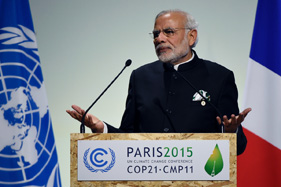Rich v poor it’s as simple as that

UK Bombing Syria & COP21 – what is the downturn risk for tourism?
I make no apology for putting these two issues – the terrible situation in the Middle East and COP21 – together because, actually, they are very closely related symptoms of the same malaise.
The Syria/climate change issue is easy to see. The UK’s Prince Charles, put it succinctly in an interview with Sky News
The fact is that, as climate change takes place, there will be more and more natural disasters, worse harvests, fewer and fewer resources leading to wars and violence.
We see the millions of refugees as fleeing from conflict, but actually the root cause of the conflict is climate change.
And Syria is possibly only the beginning, as climate-change related violence increases, there will be more and more refugees.
The response of the developed world? Simple – bomb the focal centre and try to keep the refugees away. It’s possibly not a sustainable solution. If the situation develops, it is very likely to affect global travel and tourism even more.
So, look forward to ever-increasing security at borders, which is not going to encourage world tourism one little bit.
In Paris there are high hopes for COP21 coming up with a global emissions agreement. But unfortunately this agreement will almost certainly predicate a global temperature increase of around 2.7degrees. Unfortunately, too, this agreement will not have any teeth. Already the US has clearly stated that it will not be an enforceable legal document.
So, it’s great that all the big powers are lined up together against this common problem, but, basically, that’s all they’re doing – lining up. It’s an agreement of principle rather than practice.
Simon Kuper has it about right in the Financial Times
We’ll probably lose cities like Miami, naturally deltas like Bangladesh, the Po Valley and many, many islands. But on the upside climate change will melt the permafrost in Russia, open up the Arctic and the Antarctic to development, and the world will change.
Naturally rich countries will win and poor countries will lose … leading to more migrations (500 million have been predicted)
The answer – adaptation rather than just mitigation. In the next 20 years tourism will change dramatically.
For example… where will you ski?
When will you go to the Med, or other seaside resorts that are nicely warm now and will be far too hot then? Provided, of course, they still exist.
So seasons and destinations and activities will change.
And transportation? Do you really think that we’ll want to add to this overheating? Low emission transportation will be de rigeur. So look out for high load-factor trains rather than airplanes.
Where will tourists stay? In emission-managed hotels – obviously.
And markets will change too. Tourism will be again a rich-only activity – who, after all, is going to pay for that security?
So – ten years ago our choices were mitigation and adaptation. We probably will fail at the initial big mitigation opportunity and will be faced with no choice. Both big hurdles will have to be surmounted.
This subject was discussed seriously in 2008 (when we could have done much more) and a major document produced as a result.
To get an idea about what the world of tourism will be like in 20 years, it is worth at least a skim-through.
And to keep up with this critical subject register at http://www.sustainabletourism2015.com
Valere Tjolle
 United Kingdom
United Kingdom United States
United States Asia Pacific
Asia Pacific












































BA suspending all Heathrow to Abu Dhabi flights
Unexpected wave rocks cruise ship
Report: Cruise guest died after ship lashed in heavy storm
British teen in serious condition after paraglider collision
JetBlue scraps London Gatwick flights